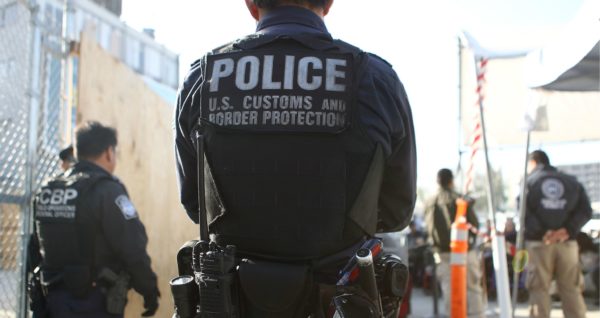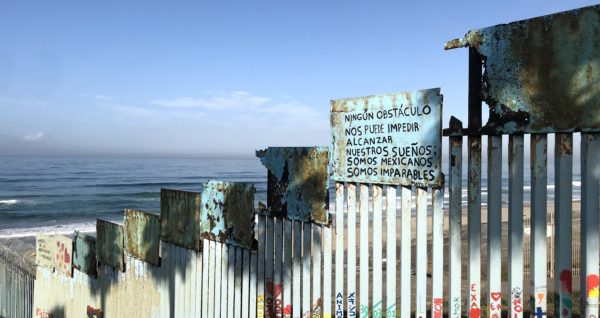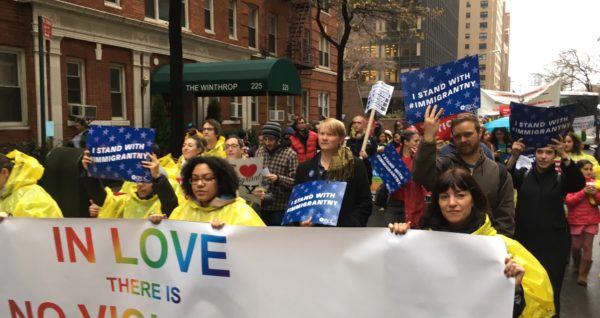Sanctuary attorney Natali Soto writes about our legal team’s experience assisting asylum-seekers in Tijuana, Mexico, as the U.S. implemented new deterrence protocols.
Natali Soto is an Immigrant Justice Corps Fellow and an attorney in Sanctuary’s Immigration Intervention Project
—
In light of the current humanitarian crisis at the U.S.-Mexico border, my fellow Sanctuary immigration attorneys and I spent the first week of February working with asylum-seekers in Tijuana, Mexico. That same week, the U.S. rolled out its “Migrant Protection Protocol,” a policy which requires most asylum seekers who have passed their credible fear interviews to remain in Mexico, instead of the U.S., while they wait for a U.S. Immigration Judge to hear their asylum case.
Throughout our time in Tijuana, we met beautiful souls from all over the world – including Mexico, Guatemala, El Salvador, Honduras, Venezuela, Nicaragua, Haiti, Ghana, Cameroon, Sierra Leone, Guinea, Tajikistan, Chechnya, and Russia – who had fled gender violence and other forms of persecution and violence in their home countries. These migrants had traveled thousands of miles by plane, bus, boat, and by foot, driven by hopes of finding asylum in the U.S. They endured unimaginable hardships throughout their dangerous journeys only to find out, upon their arrival at the U.S.- Mexico border, that they must “wait in line” for weeks, even months, before being allowed to present their asylum claim to a U.S. Immigration Officer.
Listen to our attorneys describe the circumstances that have forced survivors to flee their home countries and seek refuge in the U.S.
The Current State of the Asylum-Seeking Process
This line-keeping system is a direct outcome of the Trump Administration’s “metering” policy, implemented in November 2018, which limits the number of asylum seekers allowed to enter the US each day. The system, however, is anything but official. Rather than being run by Customs and Border Protection (CBP) or any other U.S. or Mexican government agency, the line is managed by migrants who have assumed a leadership role among their peers. Newly-arrived asylum seekers must provide their names and nationalities to these migrant leaders in order to be assigned a number that corresponds to their place in line, supposedly based on the order in which they arrive.
Every day, CBP settles on a seemingly-indiscriminate number of people to allow into the U.S. and notifies Mexican officials who, in turn, pass this information to migrant leaders. The leaders then call out certain migrants’ numbers to indicate that those individuals are now allowed to cross into the U.S. to kickstart the asylum-claim process. Because the U.S. is inconsistent in the number of asylum seekers they’ll accept on any given day, these migrants must show up every morning, with their children and all of their belongings. If they are not present when their number is called, they will have to either plead to keep their spot in line or sign-up for a new number and wait several more weeks.
Migrants whose numbers have been called are lined up, put into vans, driven across the border, and kept in detention centers until their credible fear interviews, where a CBP officer will assess their fear of return to their home country. Unfortunately, even passage of these credible fear interviews does not guarantee temporary safety in the U.S. – under the Migrant Protection Protocol, asylum seekers must meet an even higher “reasonable” fear standard by demonstrating they fear persecution both in their home countries and in Mexico. Unfortunately, many vulnerable individuals who “have not had time to gather evidence that would show their credibility,” or whose claims include trauma-related inconsistencies or omissions, will fail to meet this higher standard and be sent back Mexico to await the adjudication of their asylum case.
Watch Lori Adams, Director of Sanctuary’s Immigration Intervention Project, describe the situation at the U.S.-Mexico on the third day of implementation of the “Migrant Protection Protocol.”
Our Work at the Border
Part of our duties as volunteer attorneys in Tijuana included delivering “Know Your Rights” presentations and meeting with migrants individually to provide them with legal counsel on their respective asylum cases. We also held last-minute credible fear interview prep sessions for migrants whose numbers had been called that morning. Although some migrants had anticipated the strenuous conditions they were about to face upon entering the U.S., others had reasonably assumed the worst of the asylum process was over. Had we not told them, the latter group would not have known that upon entering the U.S., they would be stripped of their extra layers of clothing and forced to await their credible fear interview in freezing holding cells for days at a time.
Listen to Sanctuary attorneys describe how they assisted migrants as they prepared to cross the border to deliver their credible-fear interviews — the first step for claiming asylum in the United States.
While conducting these last-minute interview prep sessions with migrants about to cross the border, my colleagues and I acted as “human shields” to provide privacy for those who needed to change into their warmest base layer. We also provided migrants with Sharpie markers so that they could write their loved ones’ phone numbers on their forearms, in the likely case that ICE would take away their possessions. We also encouraged parents to write their own names and dates of birth on the backs of their children’s shoulders in preparation for the tragic yet foreseeable case of ICE separating families upon crossing. Two young kids with whom I worked thought of these as “cool new tattoos” and showed them off to fellow migrants while their mother held back her tears fearing that these marks would not be enough to keep her children by her side.
Having to explain to families that they would most likely be separated at some point during the asylum claim process and that they would most likely be returned to Mexico while they await adjudication, was soul-crushing. When migrants learned about the new policies central to the current U.S. Immigration System, their hopefulness and excitement would immediately turn into anguish and disappointment, yet for many of them turning back was not an option. When you are fleeing for your life, not even a cruel system that is purposefully set in place to deter you from seeking asylum will dissuade you from pleading for safety.
Listen to our attorneys describe the anguish experienced by migrant families facing separation at the border.
My colleagues and I stayed in San Diego and crossed the border by foot twice a day since the people we were working with were in Tijuana. Throughout the week, I could not avoid thinking of the irony and privilege that underlined our back-and-forth crossings, during which we did as little as wave our U.S. passports to border officials. We were able to easily cross this arbitrary line only because we were born on the “right” side of it, while those who were born elsewhere and are fleeing for their lives were kept waiting for weeks for an opportunity to plead asylum in our country.
We hope that our experiences at the border can further shed light on what has become an undeniable reality – that our current immigration protocols are inhumane and deprive thousands of migrants of their basic human rights. These asylum seekers are fleeing domestic violence, gang violence, and government torture, among other types of unbearable persecution. Sending them back to Mexico, even after they have passed their credible fear interviews, is a violation of due process. It also puts them at greater risk of harm, for many of them are still being followed by their persecutors and perpetrators.
As a nation founded under the principles of life, liberty, and the pursuit of happiness, we must embrace those who are most vulnerable, not turn our backs on them.
Please consider donating to Sanctuary’s Immigration Intervention Project to support our work with immigrant survivors of gender violence.
Pa’ lante, mi gente.



